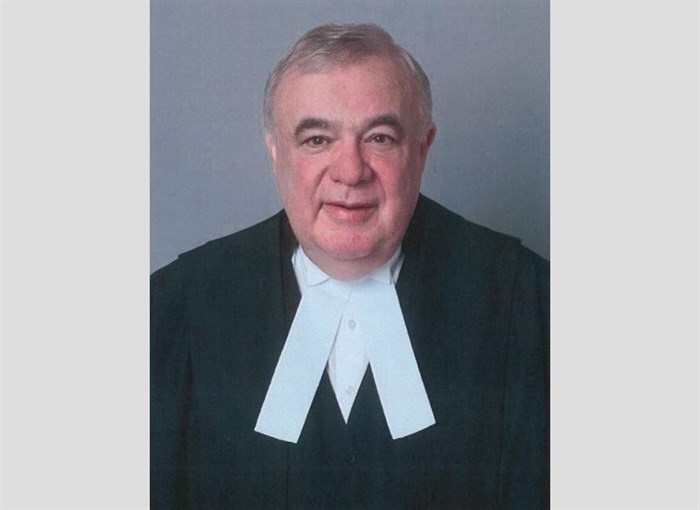
B.C. Chief Justice Christopher Hinkson is seen in an undated handout photo. The chief justice of British Columbia's Supreme Court says he is frustrated with what he calls the "failure" of the federal Justice Minister to appoint judges and is calling on her to urgently fill at least nine vacancies in the province.
Image Credit: THE CANADIAN PRESS/HO-British Columbia Supreme Court, William Huang
February 08, 2018 - 1:01 PM
VANCOUVER - The chief justice of British Columbia's Supreme Court says he is frustrated by the federal government's "failure" to appoint judges, and is calling on Ottawa to urgently fill at least nine vacancies in his court.
Christopher Hinkson said he is speaking out now because he has exhausted all other options to persuade Justice Minister Jody Wilson-Raybould to fill the positions.
"I don't like rushing off to the press and trying to confront the minister in that fashion. I don't think it's productive for the court and I'm pretty sure it's not terribly productive for the minister. But I've given up the softer approaches because they simply haven't worked," he said Thursday.
"We still remain with an insufficient number of judges to serve the needs of the public in British Columbia and to provide what has been promised to them, and that is access to justice."
Hinkson said there are 10 vacancies in the court, while the federal government puts the figure at nine. He added that he'd hoped that Ottawa would establish five new judicial positions in B.C. this year, but it has not.
Most Monday mornings, he meets with litigants whose cases have to be delayed — some for up to a year — because judges are not available, he said. Sometimes there are just two or three such litigants, while other times there are 8 to 10.
"I have explained to them that, in my view, they should have had a judge, and if we had a full complement, they would have had a judge," he said.
"They doubtless will have had to pay their lawyers to prepare for the case and they will get to do that again."
The nine or 10 vacancies account for 10 per cent of the B.C. Supreme Court's judiciary and include the important position of associate chief justice. Judges are overworked, burdened by more complex cases and appear to be retiring earlier, he said.
Hinkson said B.C.'s judicial advisory committee has approved more than nine candidates but many have been rejected by the minister because they are not "suitable," although he doesn't know what criteria she is using.
Wilson-Raybould did not immediately respond to a request for comment. On Wednesday, she appointed one new justice to the B.C. Supreme Court and moved a judge to the B.C. Appeal Court.
The federal government has committed to increasing diversity in the judiciary. Hinkson said while he supports that goal, if people from diverse backgrounds are not applying or do not meet the requirements to be a judge, the positions shouldn't be left vacant.
"It's taken a while to have sufficient numbers of women to suggest that they could form an equal part of the court. ... It's the same with other areas that aren't proportionally represented," he said. "There aren't sufficient people in those groups yet to populate the court.
"Sometimes, merit is going to dictate that a certain demographic is over-represented on the court because those are where the meritorious people exist."
Hinkson said his decision to speak to the media was partly inspired by the former chief justice of the Alberta Court of Queen's Bench, Neil Wittmann, who was very vocal and went to the media early on, and appeared to get Ottawa's attention.
Alberta currently has more vacancies than B.C., but it received nine new judicial positions this year, he said.
The problem is partly historical, Hinkson added, noting that the previous Conservative government left B.C. Supreme Court with six vacancies. But under Trudeau's government, that number climbed as high as 14 at one point.
"It's gone on too long," he said.
— Follow @ellekane on Twitter.
News from © The Canadian Press, 2018